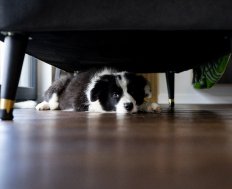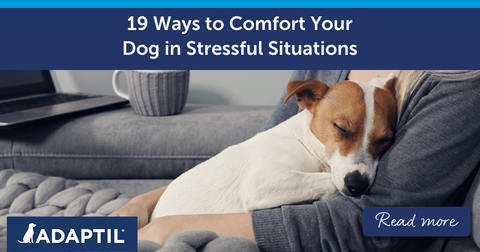
Why Do Dogs Bark? A Happy Dog Expert Explains!
Why do dogs bark? Well, barking is one of the many ways dogs communicate. In short, barking is part of a dog’s natural behaviour!
However, sometimes dog barking can become very annoying and intense, and can even have an effect on happy coexistence with people. In what situations should we be concerned if our dog barks, and how can we prevent them from barking in these scenarios?
By Patricia Darder, Health Behaviourist and Happy Dog Expert
The Role of Barking in Canine Communication
Dogs, as a social species, need to exchange information with other dogs in order to understand and organise themselves. Just as humans use speech and language, they need a system that allows for effective communication.
Within canine communication, we find auditory signals – also called vocalisations. These are the different sounds dogs produce to express themselves, and are mostly directed at other dogs, or people.
Barking is the vocalisation most frequently used by dogs (less common vocalisations include howling or growling) since it expresses a greater degree of emotion and motivation. With this in mind, barking can occur in a wide range of contexts, from joyful moments of play to more adverse situations such as illness or physical pain.

Why Do Some Dogs Bark More Than Others?
We have explored why dogs bark in general, but why do some dogs bark more than others?
We must bear in mind that there are many individual factors that will determine how much a dog barks in different situations. These can include:
-
Breed and temperament – Some dogs are naturally more vocal than others.
-
Learned behaviour – Dogs can associate barking with a reward or positive consequence, effectively teaching them to bark more. For example, a dog in the garden may learn that barking at strangers keeps them away from their territory.
Why Do Dogs Bark? Common Triggers
Any dog can bark in situations that generate a state of alarm or threat, such as:
-
People or other dogs entering the house
-
Hearing unfamiliar or loud noises
-
Close, abrupt, or invasive approaches from people or other dogs
-
Spotting possible prey such as cats, rabbits or squirrels
-
Experiencing new stimuli for the first time, such as a puppy finding a full trash bag
On the other hand, situations of excitement can also trigger a dog to bark, including:
-
Playtime
-
The arrival of family members after being home alone
-
Preparation for a walk

Demand Barking: When Dogs Bark for Attention
Puppies learn to ask for attention and care from their mother using vocalisations that include whining and barking. Known as demand barking, this can be maintained or reappear in adulthood and can be a way that dogs communicate with people for resources e.g. food, security, or social contact.
We can also observe this demand barking between dogs. For example, when one dog wants to play with another dog that is not interested, the first dog may try barking to get their attention.
When is Dog Barking a Concern?
In most cases contexts, a dog’s barking will generally be triggered by one or more clear trigger, and will reduce once this stimulus is removed. This means the barking will occur in a punctual or circumstantial (non-continuous) manner.
In other cases, however, a dog can respond with more continuous and intense barking. This can reveal deeper or more sustained negative emotional states, such as:
-
Anxiety or intense fear (e.g., noise phobias)
-
Frustration or conflict (e.g., barking when approached near their bed)
-
Stress due to separation from their pet parent (e.g., barking excessively when left alone)
-
Physical pain
Sometimes, barking also occurs in a repetitive or compulsive pattern. A dog that displays this type of barking may be in a state of environmental stress or illness, or could be experiencing cognitive changes, such as canine dementia in older dogs.
In situations of pain or distress, barking may signal a serious emotional or physical issue that requires intervention. It is advisable to seek professional help to address the underlying cause and provide appropriate support.

How Can I Stop My Dog from Barking A lot?
There are several ways to discourage barking in dogs. However, if you suspect the barking is driven by ongoing emotional distress - such as pain, anxiety, or fear – it is always best to consult your veterinarian to assess the situation and seek their advice.
One of the most effective strategies is to avoid reinforcing barking behaviour. For example, if your dog barks for attention, food, or play, refrain from rewarding them in those moments. Instead, redirect their focus to alternative behaviours such as sitting, recalling, or lying down, which can teach your dog more appropriate ways to ask for attention.
Socialisation and properly habituating puppies are also important. This helps puppies build skills to tolerate and normalise different situations, stimuli, and noises, which can reduce barking motivated by an alarm or perception of a threat.
Finally, encouraging a state of calm in exciting situations – such as greeting your dog in a relaxed manner when you return home – can also help prevent unwanted barking.
Are you interested in learning more about dogs and their behaviour? We have a huge range of articles to explore online, plus you can sign up to our newsletter to stay in the loop with all the latest tips, guides, and info!








































